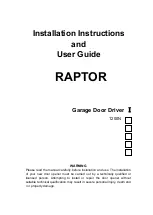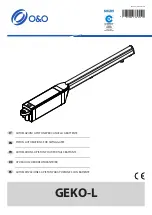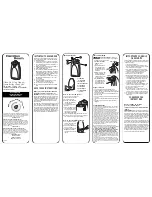
if the automation system is closing;
if the automation system is opening. The system will then re-elose when
actuated by the aulomatic closing timer.
during opening
If the obstacle is still detected:
during closing
{\
STARTING
UP THE SYSTEM
VERIFICHE
PRELIMINARI
Before start-up, make sure that:
.{
The electric lock (if installed) has been manually released;
.{
The proper tension has been applied to the belt (see p. 12);
.{
The checks described on p. 13 {checking for proper assembly} have been performed;
.{
No objects are present along the path taken by the door wings as they move;
.{
All mounting hardware has been properly tightened;
.{
The sensors are correctly aligned and are not blocked;
.{
The desired functions have been correctly selected on the dip switches (see p. 16);
.{
The trimmers have been set to their midpoints {see p. 15},
START .UP/CALIBRATION
1,
Tum on the power to the unit
- LED no. 3 will light up
2.
Move dip switch 1 to ON
- LED no. 3 will turn off and LED no. 8 will light up
- The system will execute an closing and opening cycle at reduced speed and will stop at the maximum open
position (" at the end of the cycle
- LEOs no. 6-7-8 will light up
3.
Move dip swilch 1 10 OFF
- LEOs no. 6-7-8 will turn off and LED no. 3 will light up
4,
Make sure that function swilch MA7041 (if installed) has been set
10
the "open' position (with the LEOs lit in
sequence)
5.
Enter an "open" command on 2-R1/2-R2 or by pressing the open key (see p.15).
-the automation will position itself at the closing point
6.
Send an opening signal
-the automation will perform a complete manoeuvre
7.
Adjust the movement of the doors using the door trimmers (see p.15).
8.
Adjust trimmer 3 to obtain the desired delay before automatic closing
9.
Trimmer 2 can be adjusted only if function switch MA7041 has been installed and if this switch has been set
to the "partial opening" position
10. Use the lever on the manual release system to re-arm the electric lock (if installed)
0,
If the automation
system stops during the closing cycle, the motor polarity may be incorrect.
If this occurs, proceed
as
follows:
-Disconnect
the mains power
- Make sure dip switch
1 is
set to OFF
- Reverse connections
M-N on the terminal board for the motor, which is IDeated in the electrical
cabinet (on the right)
- Begin another start-up/calibration
procedure
starting from point 1.
SAFETY FUNCTIONS
- Actions
taken by the automation
system
when a safety device trips
When the safety sensor detects an obstacle, the microprocessor
control system in the electrical cabinet
actuates:
re-openlng,
a stop,
the automation will automatically
try 4 times to close the doors, and then it
will stop them in the open position, awaiting a new command
the automation system will stop with the door wings resting against the
obstacle and will re-c1ose when actuated by the automatic closing timer.
The system will attempt to open the door three times, and then pause with
the door wings resting against the obstacle until another command is given;
(In both cases, normal operation with the programmed
settings will automatically
resume when the
obstacle is removed)
Changing
the direction
of door opening
(Rodeo 1)
- With the door stopped, reverse connections M-N on the terminal board for the motor, which is located in the
electrical cabinet (on the right);
- Re-align electric lock MA7012.
- Press the RESET key on the electrical cabinet (if the unit has already been calibrated, the relative settings
will be deleted).
- Start up (or restart) the automation system as described in the section on start-up.

























